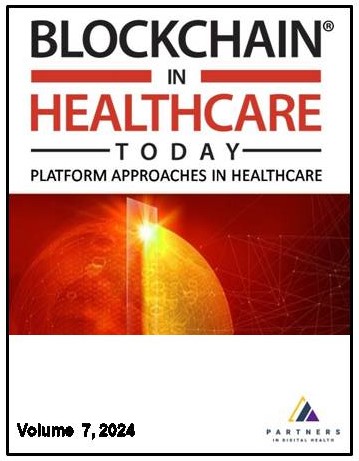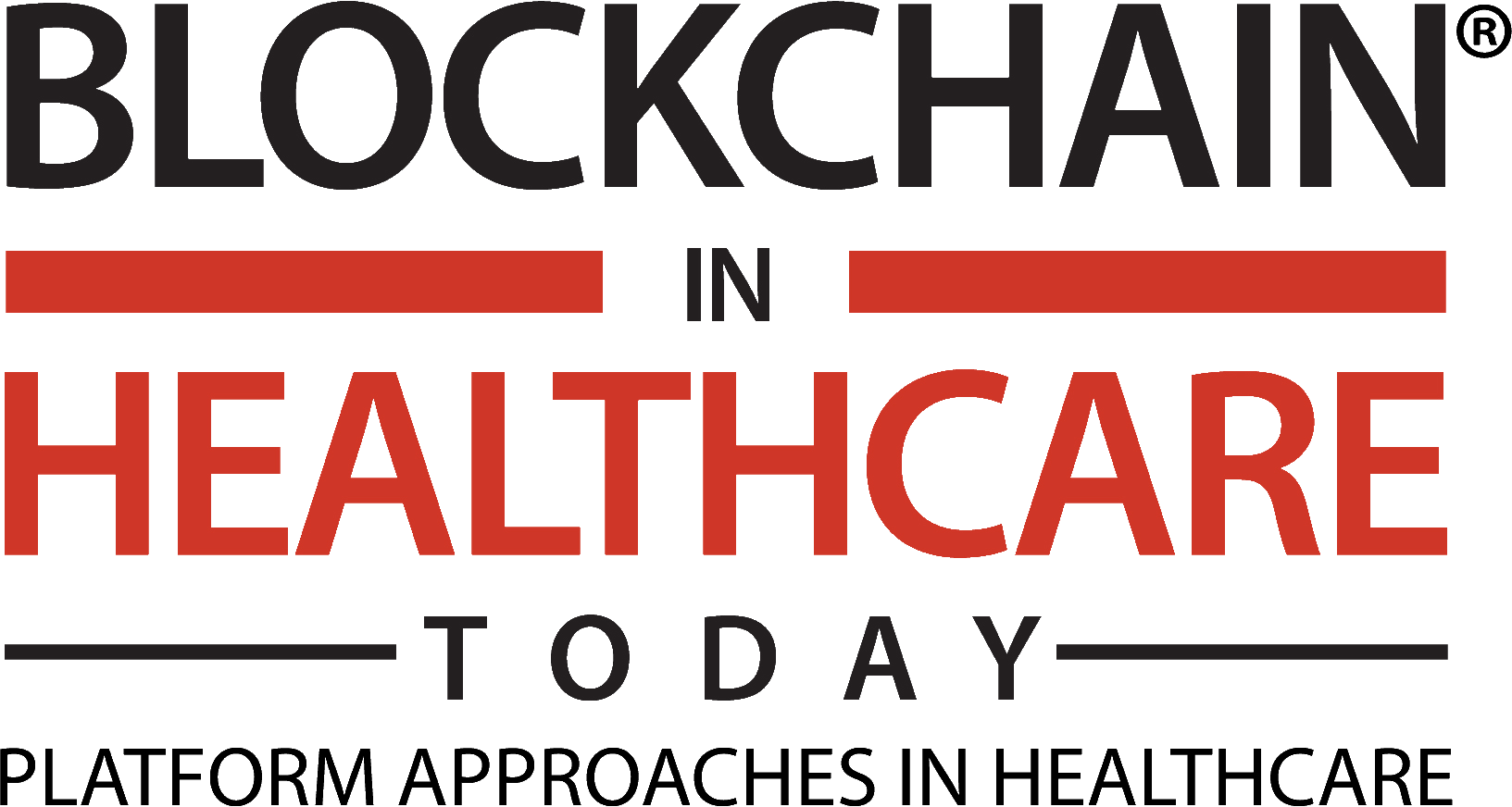Current issue

Volume 7, Issue 3, 2024
Online ISSN: 2573-8240
Volume 7 , Issue 3, (2024)
Published: 16.12.2024.
Open Access
Blockchain in Healthcare Today (BHTY) is the leading international open access journal that amplifies and disseminates platform approaches in healthcare and distributed ledger technology research and innovations. Fields of interest include healthcare information systems, leveraging data science tools and techniques, interoperability, consent mechanisms, privacy preservation, security of health data, clinical trials management, supply chain management, revenue cycle automation, immersive technologies, tokenomics, governance, regulation, network technologies, clinical computing, cryptography, and failed experiments in this expanding specialty field of research.
All issues
Contents
31.12.2024.
Original Research
A Secure and Reliable Fog-Enabled Architecture Using Blockchain With Functional Biased Elliptic Curve Cryptography Algorithm for Healthcare Services
Fog computing is an emerging technology that extends the capability and efficiency of cloud computing networks by acting as a bridge among the cloud and the device. Fog devices can process an enormous volume of information locally, are transportable, and can be deployed on a variety of systems. Because of its real-time processing and event reactions, it is ideal for healthcare. With such a wide range of characteristics, new security and privacy concerns arise. Due to the safe transmission, arrival, and access, as well as the availability of medical devices, security creates new issues in the area of healthcare. As an outcome, fog computing necessitates a unique approach to security and privacy metrics, as opposed to standard cloud computing methods. Hence, this paper suggests an effective blockchain depending on secure healthcare services in fog computing. Here the fog nodes gather the information from the medical sensor devices and the data is validated using smart contracts in the blockchain network. We propose a Functional Biased Elliptic Curve Cryptography Algorithm (FB-ECC) to encrypt the data. The optimization is performed using Galactic Bee Colony Optimization Algorithm (GBCOA) to enhance the procedure of encryption. The performance of the suggested methodology is assessed and contrasted with the traditional techniques. It is proved that the combination of fog computing with blockchain has increased the security of data transmission in healthcare services
Charu Awasthi, Satya Prakash, Prashant Kumar Mishra
31.08.2024.
Podcast
Creating a Health Data Marketplace for the Digital Health Era
With the advent of the General Data Protection Regulation (GDPR) of the EU and the development of technologies like blockchain and distributed ledger technologies (DLT), it is now possible to create a new paradigm with a shared economic model where financial Incentivization will be the main driver for data sharing. This can be achieved by setting up a digital health data marketplace (DHDM).
Speakers on s podcast authored a paper in BTHY journal entitled “From Sharing to Selling: Challenges and Opportunities of Establishing a Digital Health Data Marketplace Using Blockchain Technologies,” https://doi.org/10.30953/bhty.v5.184
Their ongoing work is discussed for the DHDM operation outlined along with current developments and future work. Questions addressed are below:
- What inspired the authors to explore the use of blockchain technology in healthcare data sharing and monetization?
- What are the key challenges and opportunities identified in establishing a digital health data marketplace using blockchain technologies?
- What are the potential socioeconomic impacts of a digital health data marketplace on patients, healthcare providers, and researchers, and how do you see the economics of health data developing into dynamic systems that will reflect in the processes of care delivery and management?
- What are the next steps for the research? Are there ongoing projects or collaborations the audience can expect to be excited about?
Imtiaz Khan, Mohamed A. Maher, Anjum Khurshid
31.08.2024.
Editorial
The European Digital Identity Wallet: A Healthcare Perspective
Within the last five years, big strides have been made in Europe to write a future-proof rulebook on data and digital. In the shadow of headline-grabbing regulations such as the Digital Markets Act and the AI Act, the eIDAS regulation was revised to establish a European Digital Identity Wallet. Defiing a clear legal and technical framework will help create trust and credibility for the development and application of new use cases within healthcare, of which the patient will only stand to benefit.
Danny Van Roijen
31.08.2024.
Editorial
Blockchain's Transformative Potential in Healthcare
In Blockchain in Healthcare Today, the journal explores blockchain's transformative potential, its current applications, and the path forward for its integration into the healthcare ecosystem. The healthcare industry is currently facing significant challenges and opportunities after COVID-19. As we navigate the complexities of increasing healthcare costs and technological updates for better patient outcomes, innovative technologies are emerging as pivotal tools for healthcare transformation. Healthcare digital platforms have witnessed revolutionizing the dynamics of healthcare systems using disruptive technologies. However, while these technologies have garnered extensive attention for their transformative potential, there remains a critical gap in our understanding of the impact of digital technology on the healthcare industry. Population health management has critical challenges in data protection, sharing, and interoperability, where personalized medicines and wearable devices are highlighted as a concern. Patients and medical personnel need a safe and simple way to record, transmit, or access information through networks without fearing for their safety. Using blockchain technology can help address these problems (Haleem et al., 2021).
Geetika Jain, Nishant Kumar, Colin Rigby
31.08.2024.
Technical Briefs & Reports
My Holistic Data Share: A WEB3 Data Share Application: Extending Beyond Finance to Privacy-Protected Decentralized Share of Multi-Dimensional Data to Enhance Global Healthcare
WEB3.0 technologies on network architectures, distributed ledgers, and decentralized artificial intelligence represents a transformative shift in how data are handled, stored and shared. These innovations promise to significantly enhance consumer data privacy rights by addressing fundamental vulnerabilities associated with traditional centralized systems and self-custody wallets. Data breaches in traditional systems operated mainly by third parties are more common, resulting in significant data leaks because of centralized storage and excessive data movement, sometimes unnecessarily. Healthcare data breaches have been a growing concern globally. Several hospitals faced operational halts on account of the impact of ransomware on patient care and privacy. WEB3 Wallets are a vital component emerging as a significant force for global financial inclusion, especially in developing economies. They promote inclusion, reduce costs and empower individuals through self-custody. Though major improvements are needed in these wallets, their use is rising steadily. The global cryptocurrency user base is expected to reach over 500 million by 2025, with substantial growth in emerging markets, according to a report by Statista in 2023. This paper introduces a concept beyond cryptocurrencies and finance into everyday real-world use cases that need combinatorial access to a person’s holistic data, including financial and health records, genomic data, and advanced directives, among others, that need to be privacy protected and shared with specific actors identified for their roles in the WEB3 ecosystem through decentralized identifiers and non-fungible token badges identifying particular recipients. The author introduced the concept at ETHBoston in April 2024, won accolades for a primitive implementation using underlying threshold cryptography technologies, and enhanced it into a conceptual holistic data share application for global healthcare, as presented in this paper.
Sathya Krishnasamy
16.12.2024.
Special Report: Guidelines, Consensus
Ethics of Blockchain by Design: Guiding a Responsible Future for Healthcare Innovation
The rapid evolution of blockchain technology within healthcare presents unparalleled opportunities for advancements, including enhanced patient data security, decentralized systems for trustless operations, and transparent supply chain management. However, as blockchain reshapes the healthcare landscape, it demands a robust ethical framework that guides its design and implementation. "Ethics of Blockchain by Design" emphasizes embedding ethical principles at the heart of blockchain innovation, fostering public trust, equity, and long-term societal benefits. This paper also proposes a set of best practices guidelines on ethics of blockchain by design.
Muthu Ramachandran
16.12.2024.
Narrative/Systematic Review/Meta-Analysis
Systematic Review of Usability Factors, Models, and Frameworks with Blockchain Integration for Secure Mobile Health (mHealth) Applications
This systematic review examines critical usability factors that influence the adoption of mobile health (mHealth) applications among older adults and identifies gaps in current usability models, including ISO 9241-11, Nielsen’s heuristics, and PACMAD. This review also explores the potential role of blockchain technology in enhancing multimodal medical data systems within mHealth applications. A comprehensive search across six databases yielded 1,073 studies, with 60 meeting inclusion criteria. Studies were analyzed through thematic synthesis to identify key success factors (RQ1) and comparative analysis to assess limitations in existing frameworks (RQ2). Key factors promoting mHealth adoption included ease of use, efficiency, error prevention, learnability, memorability, and user satisfaction. Blockchain integration emerged as a promising approach to improve data security, interoperability, and user trust, particularly for older adults who engage with complex, multimodal health data. Findings from RQ2 highlighted gaps in usability models, such as the lack of age-specific guidance for multimodal interaction, error recovery, and data privacy. These results underscore the need to define a new usability framework and incorporate blockchain to meet the unique needs of older adults in mHealth applications, supporting both secure and accessible healthcare management.
Irum Feroz, Nadeem Ahmad
16.12.2024.
Conference Presentations
Leveraging Blockchain and AI for Pharma Supply Chain Efficiency
The presentation discusses the potential of blockchain and AI to revolutionize the pharmaceutical supply chain. The author, with a rich history in healthcare technology, highlights the inefficiencies and challenges faced by the industry, particularly in areas like drug discovery, manufacturing, and distribution. Blockchain technology, with its ability to create immutable records, can enhance transparency, traceability, and security across the supply chain. This can help in tracking the journey of drugs from raw materials to the final product, reducing the risk of counterfeiting and ensuring quality. AI, on the other hand, can optimize various processes, such as drug discovery, clinical trials, and supply chain logistics. By analyzing vast amounts of data, AI can identify patterns, predict trends, and make informed decisions. This can accelerate drug development, improve manufacturing efficiency, and optimize inventory management. The integration of blockchain and AI can create a powerful synergy, leading to significant improvements in the pharmaceutical supply chain. This includes enhanced patient safety, reduced costs, and faster time-to-market for new drugs. The presentation provides a concise view of the health care supply chain processes and discusses AI patterns such as RAG, GAM and Fine-Tuning methods such as LoRA and QLoRa that can help in building trust in the supply chain.
Mohan Venkataraman
20.12.2024.
Original Research
Tracing the Blockchain Challenges in Healthcare: A Topic Modeling and Bibliometric Analysis
The application of blockchain technology to healthcare offers promise in providing solutions to some key challenges related to data sharing, privacy, security, and access control. There are however several barriers preventing blockchain adoption from spreading widely, which has prompted research efforts. This study aims to conduct a bibliometric analysis of 196 documents, indexed in the Scopus database, to examine the structure, impact, contributors, and journals. Also, topic modeling is applied to give new knowledge on the latent topical structure of this literature. As a result, five critical challenges have been identified regarding the use of blockchain in healthcare including data privacy/security, scalability, governance, interoperability and standards, and cost.
Mohammad Mehraeen, Laya Mahmoudi
25.07.2023.
Editorial
Problems with Medical Claims that Artificial Intelligence (AI) and Blockchain Can Fix
In medical insurance, there are both valid and legitimate claims that should be covered by the insurer and fraudulent or inappropriate claims that should not be paid. Problems arise in scenarios when valid claims are not paid and when fraudulent or inappropriate claims are paid. Hospitals and insurers play critical roles in these cases. Artificial Intelligence (AI) and blockchain technologies can play significant roles in addressing the problems associated with medical insurance claims. Some of the ways in which these technologies can help are using AI algorithms to analyze data stored on the blockchain for fraud detection, and leveraging blockchain's transparency to improve the accuracy of AI models by providing access to a larger dataset. The author addresses approaches for each senario.
Joe Hawayek, Osama AbouElKhir, MD






